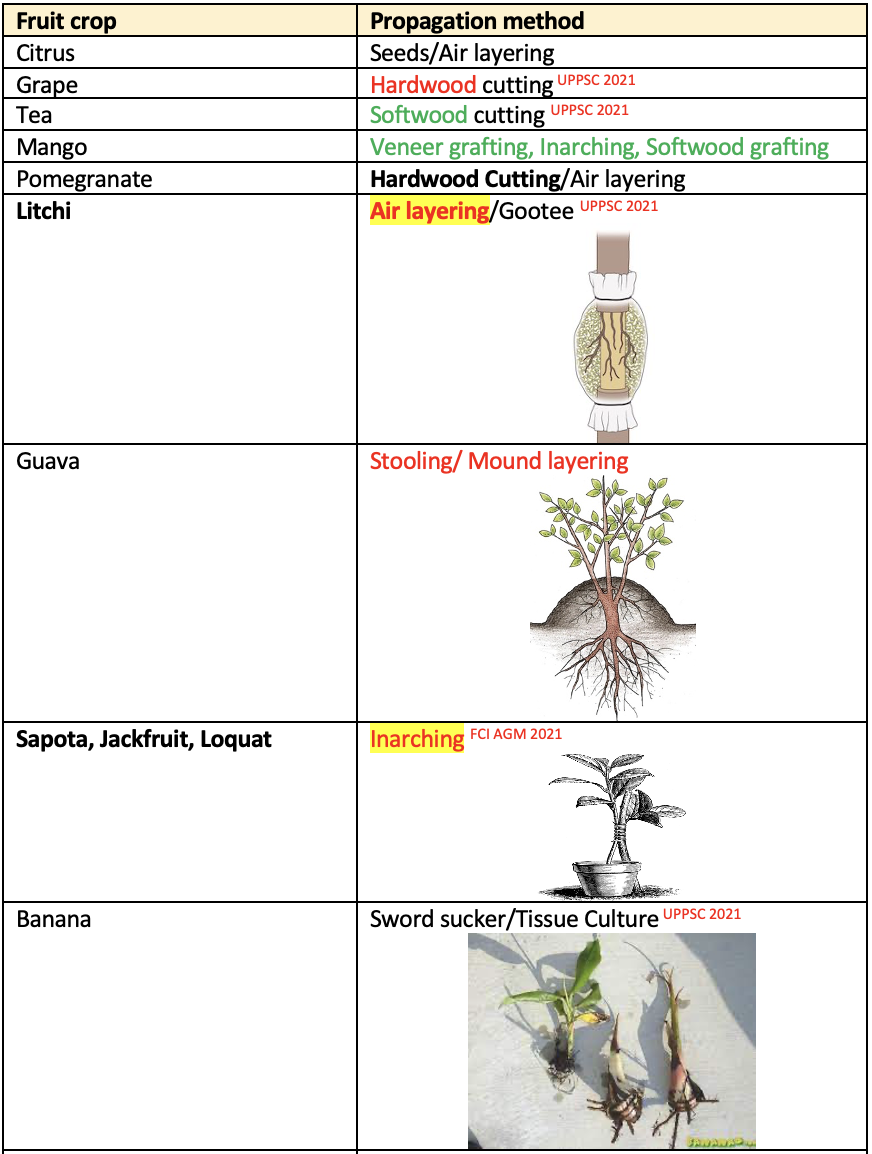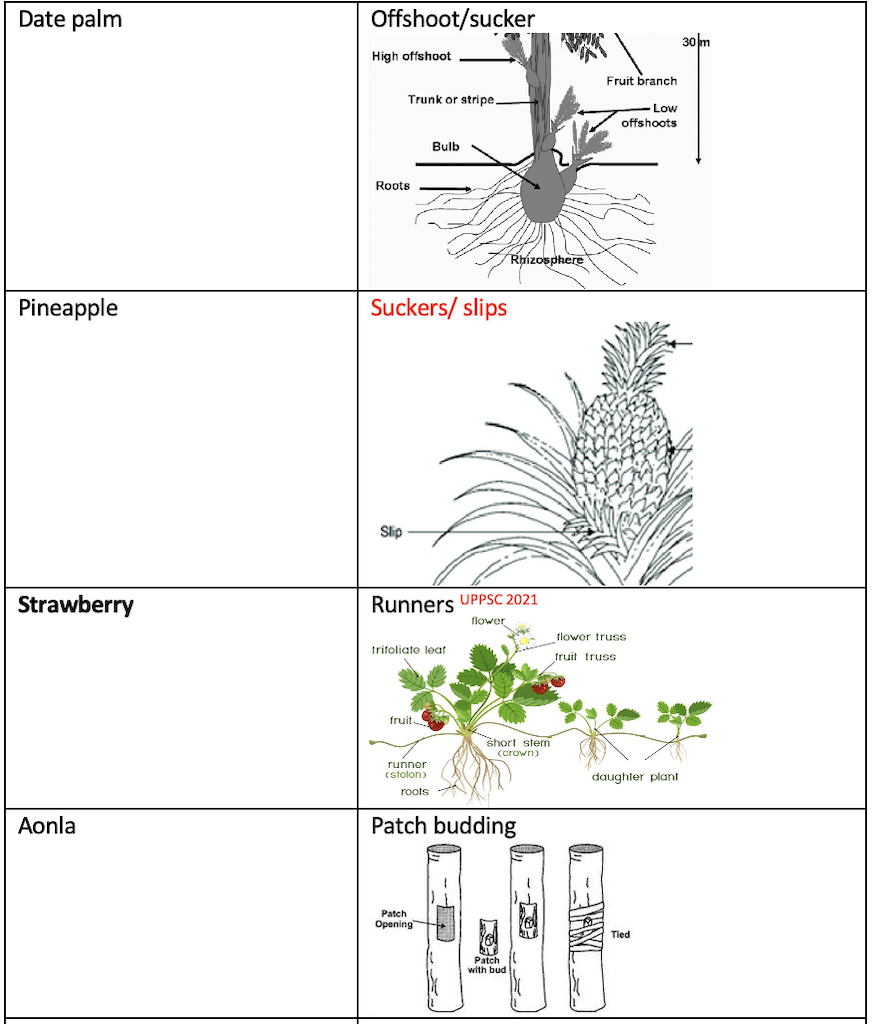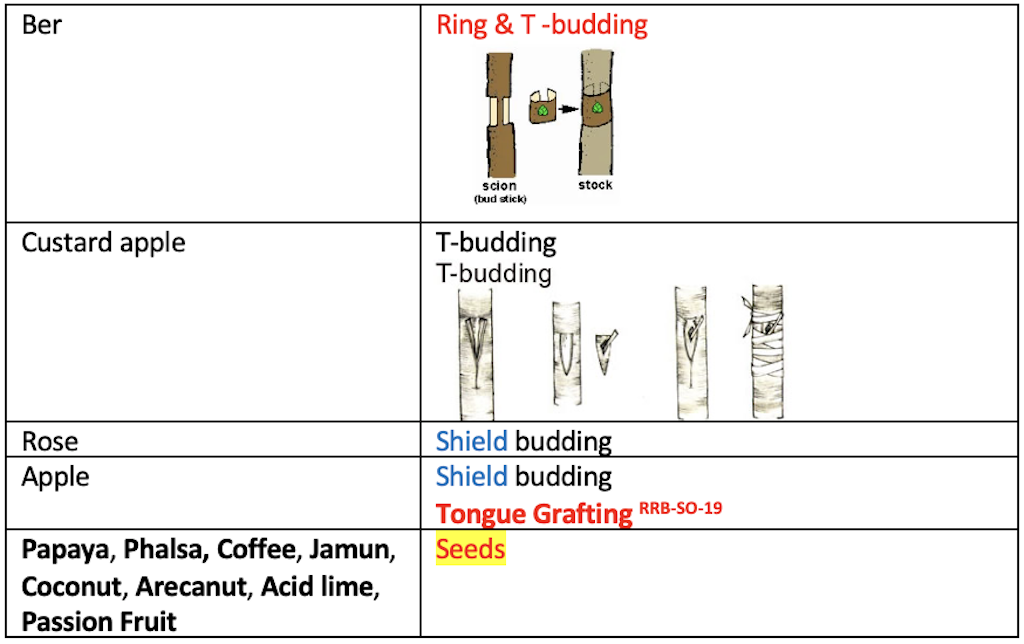👨❤️💋👨 Method of Propagation
Sexual, Asexual and Commercial propagation methods
👉🏻 Plants can be propagated by sexual and asexual means.
Sexual Methods of Propagation
- Propagation or multiplication of plants by seeds is known as ‘sexual propagation’. Seeds are formed as a result of successful fertilisation and combination of parental gametes.
- It is an old and easy method and is widely used for the propagation of crops like ornamental annuals, vegetables, medicinal and fruit plants, such as papaya.
Merits of sexual propagation
- Plants propagated by seeds live longer, are vigorous and more resistant to biotic (insect-pests and diseases) and abiotic stresses (environmental conditions).
- It is an easy, simple and convenient method of plant propagation.
- Some plants like papaya, marigold, chilli, capsicum, tomato, etc., cannot be propagated by asexual method.
- It is the only means of creating genetic diversity of plants.
- New varieties and cultivars of ornamental and vegetable crops can be developed only by this method.
- A large number of rootstocks for budding and grafting purpose is also raised by this method.
- Seeds can be transported easily and stored for a longer time using this method.
Demerits of sexual propagation
- Sexually propagated plants show variations and are not genetically true-to-type to the mother plants.
- Plants that are propagated through seeds have long gestation period, which results in delayed flowering and fruiting.
- Plants grow vigorously and cause obstruction in intercultural practices like harvesting and spraying.
- Advantages offered by rootstocks and scion as in asexual propagation cannot be exploited through sexual method.
- Crop species, which do not produce seeds like pineapple, banana, strawberry, fig, jasmine, hibiscus, bougainvillea, etc., cannot multiply by this method.
Seed
- Seed quality is considered best if pure seed % is above 98%. Moisture content: 6-8% Germination %: 60-70%.
Dormancy
- Inability of viable seed to germinate.
- Hard seed coat dormancy: Ber, Guava, Walnut
- Dormancy due to presence of ABA — temperate fruits
- Seeds of tropical and subtropical fruits are sown during monsoon.
- In Walnut, Pecanut, Jackfruit, Ber-sowing of seeds in insitu is recommended.
- Orthodox seeds: Seeds remain viable for long time at low temperature.
- Recalcitrant seed: Seeds don’t remain viable for long time at low temperature. So they should be sown immediately after extraction.
- Example: 1.
Mango2.Citrus3.Litchi4. Loquat 5. Mangosteen 6. Avocado 7. Jack fruit 8. Rambutan 9. Barbados Cherry
- Example: 1.
Methods to break dormancy
- Scarification: Process of breaking or softening the seed covering to make it permeable to water and gases.
- Mechanically: Ber, Walnut, Peach
- By Hot water: Guava, Strawberry
- By Acid: KNO3
- Stratification: Seeds are subjected to low temperature (Chilling temp) to break dormancy - Apple, Pear, Peach, Apricot
- Chemical treatment: Seeds are treated with 0.2% KNO3 (Potassium nitrate)
- Use of hormones: 1. 100-500 ppm GA; 2. Etheral (500 ppm) 3. BA (10-20 ppm) (F) Cryopreservation: Storage in liquid N, at - 196 °C temperature or liquid CO2 at 43 °C temperature.
- Cryoprotactants: 1. Glycerol 2. DMSO (Dimethyl-sulphoxide)
Asexual Methods of Propagation
- It is also called ‘vegetative propagation’. The vegetative parts of a plant like leaf, stem, root or their modified forms are used for propagation.
- Most of the horticultural crops are commercially propagated by vegetative or asexual method of propagation.
- Most of the fruit crops are propagated by vegetative means.
- Types
- Cutting
- Layering
- Grafting
- Propagation by specialized organs
✅ Merits of asexual propagation
- Many fruit and ornamental plants that do not produce seeds are multiplied by this method.
- Plants propagated by asexual propagation are true-to-type genetically.
- By top working (using budding and grafting), old and economically low productive fruit plants can be converted into superior ones.
- Advantages offered by rootstocks and scion can be exploited through asexual method.
- Maturity is uniform and the plant gives quality yield.
- Plants propagated by asexual method are small in size, so spraying of chemicals and harvesting are easy.
- This method enables noble plant production, e.g., different colours of flowers in a single rose plant and different types of mangoes in one mango plant can be produced through asexual method only.
❌ Demerits of asexual propagation
- By vegetative propagation, new varieties cannot be developed.
- It requires specialised skills, so it is an expensive method of propagation.
- The life span of asexually propagated plants is short as compared to sexually propagated ones.
- These plants are more prone to biotic and abiotic stresses.
Tissue Culture (Micro propagation)
- It is a technique for growing plant tissues isolated from the parent plant in an artificial medium and controlled environment over a prolonged period under aseptic conditions.
- It is used on commercial scale in
banana, gerbera, orchid, carnation, anthurium, etc. - It is based on the phenomenon of
totipotencyof a cell, which denotes the capacity of a plant cell to regenerate into a full-fledged plant having different organs. - Callus is produced on explant in vitro due to wounding and growth substances, either endogenous or supplied exogenous in the medium.
- By using this technique, a large number of
true-to-typevirus-freesaplings can be produced in a short span. - Types
- Callus culture
- Cell culture
- Meristem culture: Virus free plants are obtained
- Organ culture
- Protoplast culture
- Shoot tip culture technique produce female plant in
Banana. - Micro Grafting:
Citrus
- Shoot tips and Micro-cuttings are highly suitable ex-plant for faster and disease free
grapeproduction.
Plant propagation by specialised organs
- Specialised organs are modified stems or roots, developing above the ground surface or underground, which may be used for multiplication of plants.
- In horticulture, bulbous ornamentals include bulbs, corms, tubers, tuberous roots and rhizomes.
Bulb
- Bulb is a specialised underground structure having a flat basal stem and surrounded by fleshy scales.
- E.g.,
Onion.
Corm
- Corm is an underground modified solid or compressed
stemoriented vertically in the side having nodes and buds. - E.g.
Gladiolusetc.
Tuber
- It is an underground storage organ having special swollen modified
stemorroots. - E.g.
- Root tuber like dahlia, caladium, dioscorea, Jerusalem artichoke, etc. and
- Stem tuber like
potato, begonia etc.
Rhizome
- A modified
stemof some plant growing horizontally just below the ground surface - E.g.
gingeretc.
Runner
- It is a modified stalk, which is creeping in nature, produced in the leaf axil and grows out from the parent plant.
- It grows horizontally along the ground, where roots are produced at the nodes, which can be used to produce new plants.
- E.g.,
Strawberry(typical example) doob grass, chlorophytum, etc.
Sucker
- It is a special shoot arising from the root or stem portion of a plant below the ground level.
- E.g.,
Banana, chrysanthemum (stem), Clerodendron splendens (root suckers), anthurium, etc.
Offsets
Date palm
Commercial propagation methods of major fruit crops



👉🏻 Plants can be propagated by sexual and asexual means.
Sexual Methods of Propagation
- Propagation or multiplication of plants by seeds is known as ‘sexual propagation’. Seeds are formed as a result of successful fertilisation and combination of parental gametes.
- It is an old and easy method and is widely used for the propagation of crops like ornamental annuals, vegetables, medicinal and fruit plants, such as papaya.
Merits of sexual propagation
- Plants propagated by seeds live longer, are vigorous and more resistant to biotic (insect-pests and diseases) and abiotic stresses (environmental conditions).
- It is an easy, simple and convenient method of plant propagation.
- Some plants like papaya, marigold, chilli, capsicum, tomato, etc., cannot be propagated by asexual method.
- It is the only …
Become Successful With AgriDots
Learn the essential skills for getting a seat in the Exam with
🦄 You are a pro member!
Only use this page if purchasing a gift or enterprise account
Plan
Rs
- Unlimited access to PRO courses
- Quizzes with hand-picked meme prizes
- Invite to private Discord chat
- Free Sticker emailed
Lifetime
Rs
1,499
once
- All PRO-tier benefits
- Single payment, lifetime access
- 4,200 bonus xp points
- Next Level
T-shirt shipped worldwide

Yo! You just found a 20% discount using 👉 EASTEREGG

High-quality fitted cotton shirt produced by Next Level Apparel